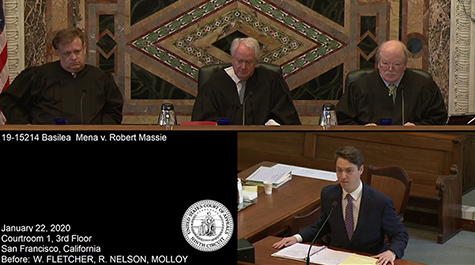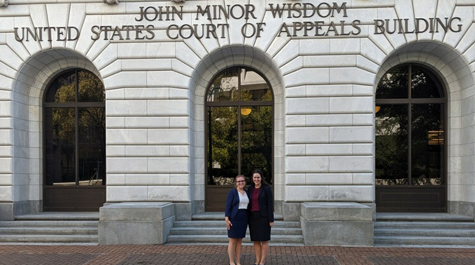Appellate and Supreme Court Clinic Enjoys a Busy Year with Lots of Arguments
Third-year students in William & Mary Law School’s Appellate and Supreme Court Clinic love an argument, and have recently logged the miles to prove it.
On November 5, 2019, Taylor Sias Maheda, assisted by Hillary Kody, was in New Orleans in front of the Fifth Circuit arguing in the matter of Pena v. City of Rio Grande. On January 14, Kody, assisted by Maheda, was in Montgomery, Ala., arguing Cantu v. City of Dothan at the Eleventh Circuit.
Eight days later in San Francisco, Damian Gallagher, assisted by Darrell Getman, made the case in Mena v. Massie at the Ninth Circuit. And most recently, on February 4, Dixon Wallace, assisted by Sam Gross, headed off to New York City to argue United States v. Elder before the Second Circuit.
Taking cases to a Court of Appeals after someone has lost in a federal district court and facing a row of judges can be daunting for any student, but Gallagher has a better word for it: Exhilarating.
“When you first step up to the podium, you have so many thoughts racing through your head and you try to take a brief moment to collect those thoughts and prepare to zealously advocate for your client,” Gallagher says.
Argument prep is time-consuming, even exhausting, but it boils down to being able to answer any question a judge throws at you.
“When you are finally standing there, before three judges who wholly want to discuss the state of the law and implications from your particular case, it really can take your breath away,” Gallagher says.
Research is intense. As often happens, Hillary Kody argued a case that had been briefed by a team during the previous year’s clinic. She began by reading the briefs, reviewing approximately 750 pages of record appendices, and studying all the cited case law.
“I took notes throughout this process, particularly listing out any questions I thought the judges might ask during oral argument,” Kody says. “I then brainstormed answers to these questions and developed the body of my argument.”
In the week leading up to the argument, Kody practiced with panels of professors, clinic members, the clinic’s managing director and trial counsel.
“These moots gave me the opportunity to refine my answers and present a more compelling case,” Kody says. “While preparation involved many hours of work over the course of several weeks, I felt incredibly prepared when I ultimately presented my argument to a panel on the Eleventh Circuit.”
All that prep not only helps students learn the case (and the law), but improve their skills. Working with faculty, Gallagher learned that the best advice is less is more.
“Judges are busy people, and when you can take an otherwise complicated case and deliver a concise, yet thoughtful, response, your argument is even more compelling,” Gallagher says.
For her part, Hillary Kody is grateful for experiences that even some long-practicing attorneys never get, including arguing a federal appeal and writing a Supreme Court amicus brief.
“Through my work in the clinic I have become a better advocate and writer,” Kody says. “More importantly, I've had the ability to work on behalf of my clients and shape the state of the law. I cannot more highly recommend the Appellate Clinic to other students.”
The Appellate and Supreme Court Clinic was founded in 2012 by Tillman Breckenridge, a partner at Pierce Bainbridge Beck Price & Hecht LLP in Washington, D.C, and the 2017-18 St. George Tucker Adjunct Professor of the Year. As adjunct professor of law & managing attorney of the clinic, Breckenridge has worked tirelessly with students on cases.
Not counting its eight pending cases, the clinic has had 25 appeals in the US Courts of Appeals, 22 of which were granted oral argument, with students arguing from Richmond to San Francisco—10 of the 13 different circuits. The clinic takes on the toughest cases, focusing on First Amendment (free speech and religion) and Fourth Amendment (search and seizure) cases, and yet it has received 24 decisions (one settled on the Clinic’s entry into the case), winning 12 of them, losing seven outright, and having five where the clinic lost but won the legal precedent it sought. It also has submitted several amicus briefs in the Supreme Court of the United States—with the Court citing its brief in Riley v. California—and filed several cert petitions, one of which garnered National Law Journal Brief of the Week honors.
After eight years, Breckenridge is stepping down to devote full time to his duties at his law firm. Joining him in the clinic this year as codirector is Dwayne Sam, an experienced appellate and trial litigator, also with Pierce Bainbridge in Washington, D.C. Sam, whose practice focuses on high-stakes, complex proceedings concerning constitutional law, administrative law and communications law, will become the clinic’s managing attorney at the end of spring semester.
Before then, an argument in front of the Eighth Circuit is likely coming up in April or May, with venue still to be determined.
Rest assured that the clinic’s students will be ready for it.
UPDATE (Feb. 26): It's a win for the clinic in Mena v. Massie, argued by Damian Gallagher, assisted by Darrell Getman, briefing by Gailen Davis and Evan Lewis!
About William & Mary Law School
Thomas Jefferson founded William & Mary Law School in 1779 to train leaders for the new nation. Now in its third century, America's oldest law school continues its historic mission of educating citizen lawyers who are prepared both to lead and to serve.

